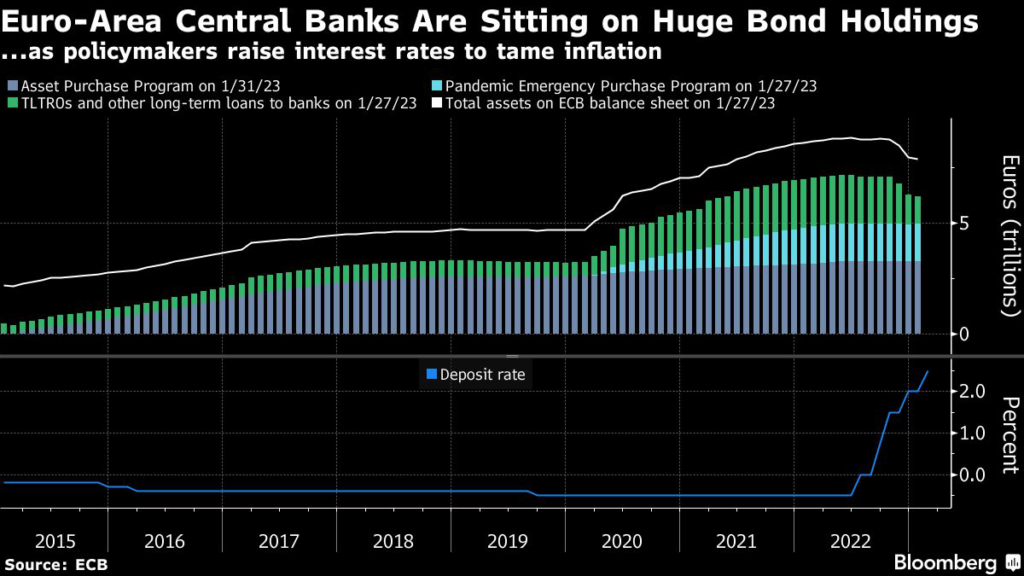The euro area’s central banks will disclose their first significant losses from a decade of money printing in the coming weeks, heralding a new era of scrutiny and the prospect of taxpayer bailouts.
(Bloomberg) — The euro area’s central banks will disclose their first significant losses from a decade of money printing in the coming weeks, heralding a new era of scrutiny and the prospect of taxpayer bailouts.
When the European Central Bank reveals annual results on Thursday, officials are expected to warn of big shortfalls this year and next across the region as higher interest rates make the cost of servicing deposits built up through quantitative easing soar.
The ECB release will foreshadow a series of awkward national reports, with Germany’s Bundesbank potentially facing the biggest hit of all.
“Results will turn negative for many banks already in 2022, because of the mismatch of interest rates on assets and liabilities,” Bank of Portugal Governor Mario Centeno said in an interview.
“We finance ourselves now at higher interest rates, which do not match the return of bonds and all sorts of debt in the central bank’s balance sheet.”
Euro-area losses would add to a list of examples globally, with the neighboring Swiss National Bank standing out for its record shortfall last month.
The prospect has left some officials nervous at the light they risk shining on the region’s financial plumbing, and possible fiscal implications.
The Bank for International Settlements insisted this month that such outcomes don’t matter, that central banks can operate with negative equity and that they can’t go bankrupt.
Above all, officials claim losses have no bearing on monetary policy.
Even so, the ECB has criticized monetary shortfalls elsewhere in the European Union, and its own rules can require governments to fork out money for national central banks.
It’s even feasible that the Frankfurt-based institution itself could need aid.
The Bundesbank will probably post small losses for 2022, rising to €26 billion ($28 billion) in 2023 if ECB rates stay at current levels, according to Daniel Gros, a board member of the Centre for European Policy Studies in Brussels.
That would wipe out the €20 billion of provisions for losses on asset purchase programs as well as its €5 billion of capital and reserves.
For a normal company, that could mean insolvency.
A Bundesbank spokesperson declined to immediately comment when contacted by Bloomberg.
Gros expects a warning in the annual financial statements, and for the Bundesbank to “try to negotiate quietly a capital infusion from Berlin” later this year.
However, in the last episode of repeated losses in the 1970s, officials rolled over the shortfall into subsequent years, raising the prospect that they might just do that again.
Other counterparts also face big losses in 2023, but not enough to wipe out capital.
Gros expects those to total €17 billion in France, €9 billion in Italy and €5 billion in the Netherlands. If rates remain high in 2024, the Dutch and French central banks would be at risk of negative equity too.
In September, Dutch central bank chief Klaas Knot warned his government of “cumulative losses that will be considerable” in coming years.
“In an extreme case, a capital contribution” from taxpayers “may be necessary,” he said.
Jerome Haegeli, chief economist at Swiss Re and a former SNB official, said losses are likely to subject central banks and their money-printing programs to closer political and public scrutiny.
The combination of high inflation — blamed by some partly on QE — and any taxpayer transfers needed to reverse negative capital positions can be seen as “a super tax on economies,” he said.
“Together with central banks not providing windfall gains anymore means the public deficit increases,” he said.
In the worst case, filling financial holes at central banks could mean governments “needing even higher taxes.”
The double impact puts central banks’ “most important asset at risk, which is their de facto independence,” Haegeli said.
The losses arise because the ECB created liquidity by buying €5 trillion in predominantly government bonds to stoke inflation and stabilize financial markets through the pandemic.
A big part of those funds returned as deposits.
National central banks pay interest on them at the ECB rate, now 2.5%. The matching assets are fixed-coupon bonds paying just 0.5% on average, according to Gros.
Although monetary decisions are taken by the ECB, operations are run nationally.
The Bundesbank is worst affected because German government bonds were seen as a safe harbor, with low or even negative yields. The Bank of Greece, whose purchases were much smaller and of higher-yielding national bonds, is likely to stay profitable.
Euro-area institutions did anticipate shortfalls.
Total capital and provisioning buffers against losses in the overall system are €229 billion, according to the ECB. “Central banks did a huge amount of provisions during this short cycle of very good results,” Centeno said.
For years, those profits also helped finance government spending, and the reversal now means public funds may be needed to rebuild balance sheets.
In a nearby example, the UK has already approved an £11 billion ($13.2 billion) transfer to the Bank of England under a pre-agreed indemnity.
Switzerland’s central bank hasn’t needed a capital boost after its biggest ever loss — equivalent to about a fifth of Swiss GDP.
But the SNB did skip a yearly payment to authorities for only the second time, and officials have started shrinking the balance sheet, limiting future shortfalls.
A A$36.7 billion ($25.1 billion) loss at the Reserve Bank of Australia has left it with A$12.4 billion negative equity.
It said in June it hoped to rebuild reserves by retaining future profits, and hasn’t sought government cash.
According to BIS chief Agustin Carstens, that’s fine. He said this month that central banks “can and have operated effectively” even with negative equity.
“The bottom line for central banks is not profit, but the public good.”
More stories like this are available on bloomberg.com
©2023 Bloomberg L.P.










